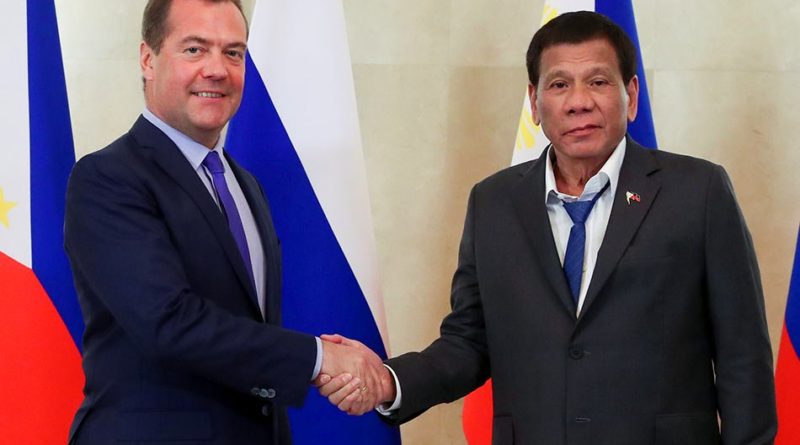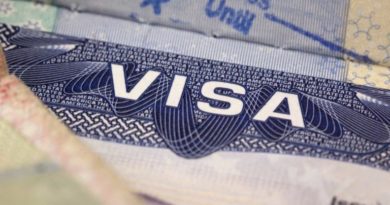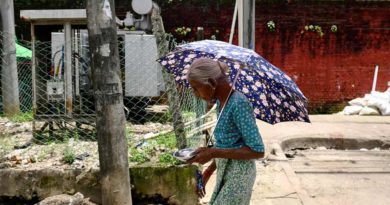MOSCOW, Russia: Exits PM Dmitry Medelev & Enter Mikhail Mishustin — the long-serving head of Russia’s tax service and seen as a technocrat — to form a new government.
Russia’s Prime Minister Dmitry Medvedev meets with Philippines’ President Rodrigo Duterte in Moscow, Russia October 2, 2019. Sputnik/Ekaterina Shtukina/Pool via Reuters
.
.
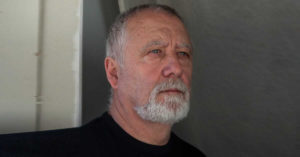
Dmitry Medvedev, who has lost his post as prime minister following the government’s resignation, served a single term as president before standing aside to allow Vladimir Putin’s return to the Kremlin in 2012.
Subsequently the 54-year-old served as prime minister with diminishing powers and authority. In recent months, his approval rating hovered around 28 percent, according to FOM polling agency.
It’s unclear how much power Medvedev will have in the newly-created post of deputy head of the Russian security council after his momentous resignation Wednesday.
Medvedev: loyal ally exits after decades with Putin
.
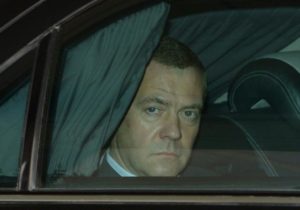
Dmitry Medvedev, a longtime ally of Russian President Vladimir Putin, loses his job as prime minister with the government's resignation
.
.
ADS by Cloud 9:
– SPACE RESERVE FOR YOUR ADVERTISEMENT –

While president, Medvedev launched a campaign of modernisation to pull the country out of its post-Soviet stagnation but never escaped the shadow of his dominant mentor, to whom he remained resolutely loyal.
On his return to the Kremlin in 2012, Putin opted for continuity after reports that Medvedev could be on his way out fuelled by his absence during Putin’s low-key presidential campaign.
First named prime minister by Putin after the strongman’s return to the Kremlin in a notorious 2012 job swap, Medvedev played a relatively marginal role in the post in recent years.
In 2019, he visited Cuba and signed the Paris climate agreement on Russia’s behalf, as well as making a controversial visit to far-eastern islands claimed by Japan.
In 2017, opposition politician and anti-corruption blogger Alexei Navalny accused Medvedev of controlling a luxury property empire in a YouTube video that has been viewed more than 27 million times and led to large-scale opposition protests.
.
ADS by Cloud 9:
– SPACE RESERVE FOR YOUR ADVERTISEMENT –

‘Freedom cannot be put off’
Medvedev was born on September 14, 1965 in Putin’s home town of Leningrad to a family of teachers, training as a lawyer and then working in the city hall for five years under Putin from 1990-1995.
He owes his entire political career to the former KGB agent.
Putin took his protege to Moscow after being appointed prime minister in 1999 and Medvedev rapidly rose to be chairman of gas giant Gazprom. He also served as chief of staff at the Kremlin and as first deputy prime minister.
Anointed successor as Putin was not allowed to stand for more than two consecutive terms, Medvedev in 2008 won presidential elections on the back of Putin’s support and his first act after taking office was to appoint the Russian strongman as prime minister.
He said Russia’s economy had reached a “dead end” and required urgent reform if the country was going to move forward.
In one speech, he even seemed to compare himself to reforming Tsar Alexander II who in 1861 ordered the historic emancipation of the serfs and would ultimately be assassinated.
“We are trying to change our economy and change our political system. In essence we are continuing a political course that was set 150 years ago. Freedom cannot be put off for another day,” he said.
But cynics pointed out that such words counted for little when Russia was still dominated by Putin and Medvedev himself played down the idea there was any radical difference in their visions.
His trademark modernisation programme was marked by some of the boldest statements ever by a Kremlin leader but was also mercilessly mocked by commentators for being short on actions.
While liberals and the West hoped Medvedev would reverse the increase in state control and erosion of civil liberties during Putin’s previous rule, he showed little desire for a radical break with Putin’s legacy.
.
.
ADS by Cloud 9:
– SPACE RESERVE FOR YOUR ADVERTISEMENT –

– Modernisation drive –
Medvedev as president sought to promote a welcoming image for the country and championed a “reset” in relations with the United States, although his jarring statements at home appeared an attempt not to be outdone by Putin in the tough-talking stakes.
He sent Russian troops into Georgian territory in the 2008 war with Tbilisi, a decision that temporarily wrecked relations with the West but one the president insisted he took on his own.
On his watch, Moscow also abstained in a key UN Security Council vote on Libya in 2011 which paved the way for a NATO-led military intervention that Putin has relentlessly criticised since.
Keen to leave behind a legacy in Russia, Medvedev ordered the building of a technology hub in the town of Skolkovo outside Moscow.
Often seen proudly clutching his iPad — a souvenir from a visit to Silicon Valley — he has embraced Twitter, Instagram and Facebook, in contrast to the much less tech-savvy Putin.
However he won mockery for this from some Russians, as for his habit of dropping off to sleep during dull events.
An ambitious man, Medvedev suggested he would like to return to Russia’s top job.
“Never say never,” he told AFP in an interview in 2012
.
.
ADS by Cloud 9:
– SPACE RESERVE FOR YOUR ADVERTISEMENT –

.
RELATED STORY:
.
Shock as Putin names new PM, lays out constitutional reforms
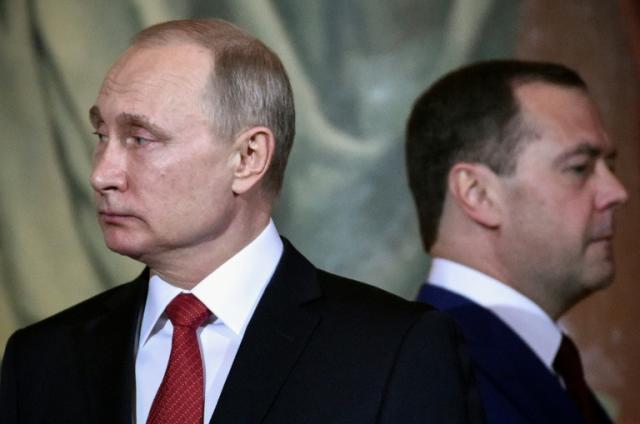
,
.
ADS by Cloud 9:
– SPACE RESERVE FOR YOUR ADVERTISEMENT –

.
Russian President Vladimir Putin named a little-known new prime minister and proposed a constitutional shake-up on Wednesday as he announced sweeping changes that fuelled speculation about his future plans.
In a shock announcement, Prime Minister Dmitry Medvedev said his government was stepping down after Putin used his annual state of the nation address to propose constitutional reforms that would strengthen parliament’s role.
Putin quickly nominated Mikhail Mishustin — the long-serving head of Russia’s tax service and seen as a technocrat — to form a new government. Lawmakers were due to meet Thursday to begin reviewing his candidacy.
Speculation swirled about how the changes might affect Russia’s political system and potentially allow Putin to stay on after 2024, when he is due to step down after a fourth Kremlin term.
Some suggested he could be laying the groundwork to assume a new post or remain in a powerful behind-the-scenes role.
The state of the nation address saw Putin propose the first significant changes to the country’s constitution since it was adopted in 1993.
.
ADS by Cloud 9:
– SPACE RESERVE FOR YOUR ADVERTISEMENT –

.
Putin said he wanted to see more authority transferred to parliament, including the power to choose the prime minister and senior cabinet members, instead of the president as under the current system.
.
ADS by Cloud 9:
– SPACE RESERVE FOR YOUR ADVERTISEMENT –

.
– ‘Demand for change’ –
The powers of the State Council, an advisory body, would be expanded and residency requirements tightened for presidential candidates and other top officials.
“Today in our society there is a clear demand for change,” Putin said in his address.
The package of reforms would be put to a national vote, he said, without specifying when.
“We will be able to build a strong, prosperous Russia only on the basis of respect for public opinion,” the 67-year-old leader said.
A few hours later, Medvedev and Putin appeared alongside each other on national television to say the government was stepping down.
Medvedev said the constitutional proposals would make significant changes to the country’s balance of power and so “the government in its current form has resigned”.
“All further decisions will be taken by the president,” he added.
Putin thanked Medvedev — who also served as Russian president for four years from 2008 — and suggested that he take on a role as deputy head of Russia’s Security Council, which Putin chairs.
“Russia has entered its period of power transition ahead of schedule,” said Tatiana Stanovaya, head of the R.Politik analysis firm.
She said it appeared Putin was preparing for a powerful post-presidential role as head of the State Council.
Medvedev had also “become toxic”, Stanovaya said, and needed to make way for a new prime minister.
Mishustin, the 53-year-old nominee for prime minister, is a relatively obscure figure who has run Russia’s tax service since 2010.
The former head of an investment group, he is a “neutral figure” unlikely to be groomed as Putin’s successor, political analyst Ekaterina Schulmann told AFP.
.
ADS by Cloud 9:
– SPACE RESERVE FOR YOUR ADVERTISEMENT –

.
– ‘Leader for life’ –
Leading Kremlin critic Alexei Navalny said he believed Putin’s goal remained to be “sole leader for life” and he expected any vote on constitutional changes to be “fraudulent crap”.
Russia last conducted a referendum in 1993 when it adopted the constitution under Putin’s predecessor Boris Yeltsin.
Putin has held a firm grip on the country since coming to power with Yeltsin’s resignation in 1999, staying on as prime minister when Medvedev took the presidency.
Re-elected to a six-year term in 2018, Putin has seen his approval ratings fall to some of their lowest levels, though still far above those of most Western leaders.
Recent polls put Putin’s rating at 68-70 percent, up a few points from a year ago, but down from a high of more than 80 percent at the time of his last election.
Hit by Western sanctions over the 2014 annexation of Crimea, Russia’s economy has stagnated and most Russians have seen their disposable income fall.
Frustration boiled over last summer, with thousands taking to the streets of Moscow to protest the exclusion of opposition candidates from local elections, leading to wide-scale arrests and long jail terms for a number of demonstrators.
.
ADS by Cloud 9:
– SPACE RESERVE FOR YOUR ADVERTISEMENT –

.
TRIVIA:
.
ADS by Cloud 9:
– SPACE RESERVE FOR YOUR ADVERTISEMENT –


